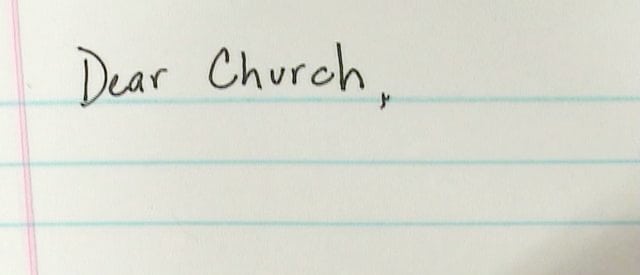…it’s the Reason I Won’t Go Back
Somewhat surprisingly, given my missionary kid and pastor’s daughter credentials, I find myself a bit of a cliché these days – a former evangelical on the Canterbury trail.
But cliché or not, I am so grateful for the little Anglican, High-Church, corner of the world I have found, how it gives space for the questions, the uncertainty, the possibility that God is the wound and not the bandage. I am grateful for space. Space is vital because deep down, I am not sure whether God exists and, perhaps more importantly, I am committed to this ‘not knowing’ as the furthest we will ever get in regard to this question.
But often I miss being an evangelical, a term I use loosely to cover the various groups across denominations committed to the authority of an inerrant Bible, who believe in a personal relationship with Jesus and the salvation story understood as creation, fall, salvation and redemption. It would be hard not to miss it – it is the paradigm I was raised in; it’s how I learned to make sense of the world.
One thing I don’t miss though, is how it can be one of the few institutions left that openly and proudly insists on an organised gender division; a division that keeps men as leaders and women as always submitting and following.
I was raised by egalitarian parents and my first meeting with gender division in the Church was when I was studying theology at Bible College. All throughout the year there were little digs at it – women can‘t preach, they shouldn’t even teach our classes, people saying they would not go to lecture if there was a female lecturer (this never became an issue, I was always taught by men), even refusing to take communion if it was administered by a woman. Then it culminated in a special seminar where all the female students were gathered and explained what their role was in the Christian Church – or that is, what their role was not. We were sat down and calmly told that we could never lead, never be responsible for doctrine, and never talk publicly about our faith unless a man was somehow ultimately responsible for what we said. I was furious. I’m still furious.
Fortunately, for the world outside evangelical Christianity, which is where I live my life these days, this is looking increasingly absurd. However, for those familiar with the tradition, it is clear that it has deep roots and even can make sense within the paradigm. If you believe the Bible is the spoken and infallible word of God, and there are some things found in it that would point to a gender hierarchy, you need to take it seriously. This is why the idea of ever going back feels a bit like a nightmare. Even if I regain some sort of conviction that God exists and speaks, I doubt that I can actively become part of the Church again. The sacrifices I would have to make in terms of how I see myself and my own personhood are simply too large. I think this framework demeans women, it teaches them to think of themselves as less than men, and is inimical to them developing their full selves. I don’t want that for myself, or for that sake anyone.
I want to make it clear though – I didn’t leave evangelical Christianity because I discovered gender division. What a person chooses to believe about the ultimate reality of life is incredibly complicated, a function of their views on the human condition, the nature of knowledge, history, the possibility of divine revelation, and I could go on. All of those things played a role in making me an agnostic; gender hierarchy didn’t.
But that spring day I was told that I was inherently unequal, and I felt inherently limited. I was told that I can share, but not preach; study, but not teach; participate, but never lead. And I was furious because it meant I was being delegated to some inferior status, some absolutely arbitrary inferiority based on the simple fact that I have a uterus.
What the proponents of gender division would say to this, though, is that it absolutely isn’t about being inferior, it is a division that expresses that ontological equality is not necessarily the same as functional equality. That is, we are in essence and before God equal, we just have different roles in the organization of human life.
But what nonsense.
First of all, it’s not different. Difference would imply that there were roles men were not meant to do too, which there blatantly aren’t. Second, this is nothing more than playing around with words, trying to make the position more palatable. But if I am not in real life, hands-on, equal, I am not equal at all.
It is a message and a view of myself I just won’t accept. I should be able to live my life to the fullest, be the best I can be, teach if I want to, lead if I want to, administer communion if I want to.
There are many things I miss about evangelical Christianity. I miss the calm early mornings, just me and Jesus, I miss the community, the selflessness. But I don’t miss the insane mental gymnastics of being equal and not being equal, of pretending I don’t know how capable I am, of brushing aside my aching sense that the fact that my male classmates were allowed to reach the top but I wasn’t was deeply unjust. In the end, life outside evangelical Christianity gave me something I would never again want to sacrifice – the opportunity to be a person, not only a woman.
Do you know people who have left evangelicalism or who stay away from the church because of teaching on gender roles? How has church teaching on gender roles impacted your own faith journey?






17 responses to “Gender Hierarchy isn’t the Reason I Left Evangelical Christianity, but…”
I found this post interesting since the things you say you miss about being evangelical are things that I don’t feel I’ve left behind at all since becoming Anglican (confirmed last Spring). I can still meet with Jesus every morning; still have community, more so now, in fact; I see selflessness and sacrifice everywhere; and I’m not asked to check my mind at the door. Like you, I’ve found the Anglican Church a place I’m allowed to have questions and doubts. And, like you, I cannot imagine going back. Since I’m not missing anything, I’m not even looking that way.
I hope nothing I said here was taken as a criticism of your feelings, I didn’t mean it that way. I just thought it was interesting that we’ve had a different experience.
Hi Sandy, thanks for sharing your thoughts, I didn’t take it as criticism at all, it really is so interesting that we had different experiences! Of course the Anglican Church is also very diverse and allows for many different expressions – which is probably one of the reasons why we like so much 🙂
I was quite pleased to see another site opening up to discuss egalitarianism. We need more people writing in this area.
That said, I was very surprised by this post. One quotation: “I am not sure whether God exists and, perhaps more importantly, I am committed to this ‘not knowing’ as the furthest we will ever get in regard to this question.”
I wonder how this kind of language makes sense in light of the doctrinal statement of this site, which states “We believe the Bible is the inspired word of God, is reliable, and is the final authority for faith and practice.” I am not trying to be annoying here, but I genuinely am confused by a statement like this alongside those I outlined above. How can one say that “Even if I regain some sort of conviction that God exists and speaks…” which seems to imply that one does not think God exists and speaks while also affirming that the Bible is the “word of God” (a God who, I would presume, exists in order to communicate this word)?
Is the statement of faith not actually binding for the site? I’m sorry, I’m just trying to understand what the position of this site is.
Hi, J.W. In reading your comment I realized that the JP team should have put a note of explanation on the front end of Marianne’s post, similar to what we did on the Facebook page that featured this link. Knowing that a lot of people in the evangelical world don’t believe restrictions on women’s roles is an important issue, and knowing the writer’s personal story, we asked her to share her experience. Our hope was to show that this is not just a “secondary” issue, but one that has a significant impact on the effectiveness of the church. As far as the statement of faith being binding, the JP team does adhere to the statement, but we will be sharing content that we think has value for discussion. We’re new at this, and really appreciate your feedback! From now on we will be more clear about why we are posting something that might be confusing. Thank you for bringing that up!
Do you guys need some assistance with blogging and that sorry of thing with WordPress? If so, I could lend a hand. I’ve worked a lot with WordPress and I have much experience with blogging and hope to word things so that people don’t get the wrong ideas.
That is very kind of you, Andrena. We just may take you up on that offer if we get stuck :). In the meantime, please feel free to pass on any constructive feedback or suggestions for improvement!
I just viewed it as a perspective that is worth reading. I appreciate the openness to dialogue. I think articles like this open up communication so people of different perspectives can learn and create safe spaces.
I loved this quote “But if I am not in real life, hands-on, equal, I am not equal at all.”
Such helpful thoughts – you put so much of my own experience into words… I, too, have found myself pulled to the Anglican traditions and it’s felt quite healing to distance myself from the evangelical church. I find that my background of seeking applicable meaning from the Bible combines so well with the richness of liturgy.
To be fair, I’ve had some friends raised in liturgical traditions look at me cross-eyed when I express my love for liturgy because they’ve experienced it as dry and repetitive. I respond that for me, praise choruses and wandering prayers hold the same level of boredom.
Internally, I’ve grinned at God’s creativity in allowing for different expressions of his character through the various traditions – the evangelicals luuuuuuv Jesus, the liturgicals revere the Father, the charismatics follow the spirit. Sometimes I wonder if God intentionally created a variety of ‘safe spaces’ for us through these various traditions. If one tradition begins to come up empty (because, as all human endeavors, they lack in some way), we don’t need to walk away from faith completely, but may benefit from a looking at it through a slightly different lens.
Andrena, thanks for taking the time to post such a thoughtful response to Marianne’s post. Like you, I’ve observed that over the years there seems to be less and less room in the evangelical church for people who don’t conform to the “party” line on some of the issues you mentioned. I’m much older than you and I can remember a time when various evangelical denominations agreed to disagree on things like women preaching, infant baptism, end times, etc. We could disagree but still respect each other’s faith and service. This no longer seems to be the case, especially with regard to gender. Now I am reading things from the complementarian camp that accuse egalitarians of having a “low view of scripture”, “adapting to the culture”, and “teaching heresy” because we don’t agree with their interpretation of 1 Tim 2 or Genesis 1-3. What a shame! The church is really suffering as a result, and we look ridiculous to the culture. I agree with you that this doesn’t make sense on so many levels! Blessings.
Really? Why are they closing the doors now then? Are their beliefs that undefendable that the slightest whiff of criticism or differentiation could cause it to collapse?
You got that right! Most comp blogs do not allow comments. Typical.
I don’t think its so much that they are closing the doors now – this started back in the late 80s and early 90s. Joe and Audra Trull do a great job describing how political this move was in their book, Putting Women in Their Place, available on Amazon. http://www.amazon.com/Putting-Women-Their-Place-Stereotypes/dp/1573124095 I highly recommend it to anyone interested in Baptist history.
Wow… a very interesting article that I enjoyed reading. One thing I do know about evangelical Christianity is it has very little room for people who stand outside of their belief system to stand up and teach, regardless of their gender. Makes me glad to come across sites that take a more post-evangelical stance on this sort of thing.
Anyway, I don’t know some people who stay away from church for gender issues. However, I can say the gender issue is part of why I’ve moved on from evangelicalism to post-evangelicalism. I came to faith in the Lord through evangelicalism and it helped me grow and grow during that time. However, this issue along with things such as biblical inerrancy, constant prejudice against those with a different sexual orientation (and I don’t mean whether or not they act on it, just the fact that they have it), and complete antagonism towards Catholicism and more liturgy-based churches is why I’ve chosen to move beyond it in my faith journey.
With regards to gender issues, specifically, I have come to this both based on my own understanding of Scripture and simply by looking around. Complementarian view of genders time and time again proves to do more harm than good, and severely limits human beings for no good reason beyond that God created them to be female. In so many ways it doesn’t make sense, and worse it makes seekers poke their heads in only to shake them and then move on. Perhaps it is a sign: We need to move on from this insistence on patriarchy too.
I hear your pain and I’m glad you’ve found a place to be. I just want you to know the church is not as bifurcated as you think. Yes, there is that part of the evangelical world that spends its time defending the bastions, but there are other parts. I was called to.ministry and couldn’t imagine how i was supposed to follow through on that, and I was found by the Evangelical Covenant Church, where I serve as a pastor. I am never relegated to the “less than,” except as all of us are called to take the lower seat. I do not rxperience being dismissed becausw I have a uterus, and we live + walk with Christ together, in that relationship with Jesus you say you miss. God bless you where you are. Just know there is more going on than you know.